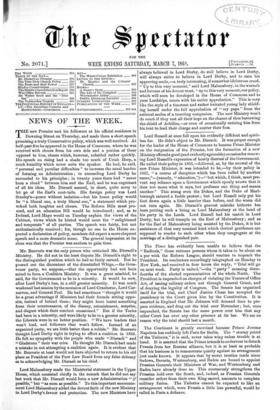Lord Russell at once fell upon his evidently diffident and
spirit- less foe. He didn't object to Mr. Disraeli. It was proper enough for the leader of the House of Commons to become Prime Minister on the resignation of the Premier, but the formation of a new Ministry offered a good (and evidentlyagreeable) occasion for renew- ing Lord Russell's expression of hearty distrust of the Government. He called their policy in 1866,—followed, as, by the avowal of the new Prime Minister, it was intended to be,—by their policy in 1867, "a course of deception which has been called by another name,"— (namely, "education,")—" but which, I think, must pre- vent any reliance upon a Government which openly avows that it does not mean what it says, but professes one thing and means another." This stung even the Dukes, and the Duke of Marl- borough entered a feeble protest ; but Lord Russell only put his foot down again a little heavier than before, and the worm did not turn again. Mr. Disraeli's gravest mistake hitherto has been putting such a being as Lord Mahnesbury at the head of his party in the Lords. Lord Russell had his match in Lord Derby, but he will trample on the Earl of Malmesbury; and as for the Earl of Malmesbury being assisted by the Dukes, it is but assistance of that very nominal kind which clerical gentlemen are supposed to render to each other when they congregate at the marriage of a distinguished pair.


































